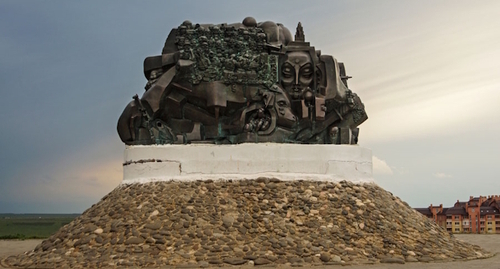
30 December 2023, 19:09
Kalmyk activists draw public attention to incomplete rehabilitation of repressed people
Public events on the anniversary of the deportation of the Kalmyk people are predominantly formal in their nature and do not attract residents of the republic, although the memory of their repressed relatives is extremely important for them, public figures note.
The “Caucasian Knot” has reported that on December 28, prayer services were held throughout Kalmykia in memory of the victims of the Stalinist deportation. Since 2004, the Remembrance Day of the Victims of the Deportation of the Kalmyk People has been officially marked in the republic.
Valery Badmaev, the editor-in-chief of the newspaper “Modern Kalmykia”, was an initiator of a separate commemorative event held in front of the monument to the victims of the Stalinist genocide next to the “Rodina” (Motherland) cinema. In 1943, deportees were herded to the cinema building, loaded into cars, and taken to Siberia.
According to Valery Badmaev’s report, almost every speaker expressed the indignation with the act of vandalism at the Abganerovo station, where a memorial plaque dedicated to the deported Kalmyk people was destroyed.
Despite the great importance of the mourning date for Kalmyks, only a small proportion of the republic’s residents come to commemorative events, Valery Badmaev believes.
Historian Utash Ochirov, an employee of the History Department of the Kalmyk Scientific Centre of the Russian Academy of Sciences (RAS), does not consider events in memory of the deportation in Kalmykia to be formalized. “It seems to me that people are going through all those historic events, the pain has not subsided. Everyone’s close relatives have experienced the tragedy, I have two aunts left in Siberia,” Utash Ochirov said.
The historian believes that in order to preserve the memory of the deportation among young people, commemorative events are not as important as systematic educational activities.
Utash Ochirov also admits that there is a noticeable trend in society towards the rehabilitation of the Stalin era, which is often presented as the best period in the development of the Soviet society.
“It goes so far as to deny the Stalinist repressions, to statements that people were subjected to repression fairly,” the historian said.
Events in memory of the deportation arouse noticeable interest, but they are not enough, believes activist Tseren Basangov, an administrator of the “OIRadio” Telegram channel.
Events at the monument “Exodus and Return,” despite their official nature, are important for preserving the memory of repressed fellow countrymen, suggests Mergen, a resident of Elista.
This article was originally published on the Russian page of 24/7 Internet agency ‘Caucasian Knot’ on December 29, 2023 at 06:05 am MSK. To access the full text of the article, click here.
Source: СK correspondent




